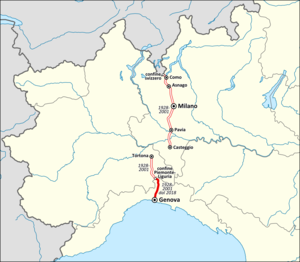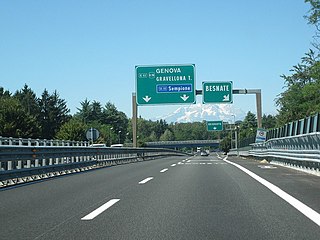
Italy has a well developed transport infrastructure. The Italian rail network is extensive, especially in the north, and it includes a high-speed rail network that joins the major cities of Italy from Naples through northern cities such as Milan and Turin. The Florence–Rome high-speed railway was the first high-speed line opened in Europe when more than half of it opened in 1977. Italy has 2,507 people and 12.46 km2 per kilometer of rail track, giving Italy the world's 13th largest rail network. The Italian rail network is operated by state-owned Ferrovie dello Stato, while the rail tracks and infrastructure are managed by Rete Ferroviaria Italiana.

Milano Centrale is the main railway station of the city of Milan, Italy, and is the second busiest railway station in Italy for passenger flow and the largest railway station in Europe by volume.

Giovanni Luigi "Gianni" Brera was an Italian sports journalist and novelist.
Misinto is a comune (municipality) in the Province of Monza and Brianza in the Italian region Lombardy, located about 25 kilometres (16 mi) northwest of Milan.

The Autostrada A26 is an autostrada 197.1 kilometres (122.5 mi) long in Italy located in the regions of Liguria and Piedmont. It is named the Autostrada dei Trafori after the numerous tunnels through which it passes, both Apennine and Subalpine. It runs northwards from Genoa on the Ligurian coast, over the Apennines, and across the wide plain of the Po valley to the environs of Lake Maggiore and the mouth of the Val d’Ossola. In addition to this ‘main trunk’ of the road, there are three side branches, also of motorway class which function as link roads between the A26 and the A7, the A4 and the A8. The A26, together with these link roads, is managed by Autostrade per l'Italia S.p.A. It is a part of the E25 and E62 European routes.

The Autostrada A7 or Autostrada dei Giovi or Serravalle is an autostrada 135.5 kilometres (84.2 mi) long in Italy located in the regions of Lombardy, Piedmont and Liguria which connects Milan to Genoa. It is a part of the E25 and E62 European routes.
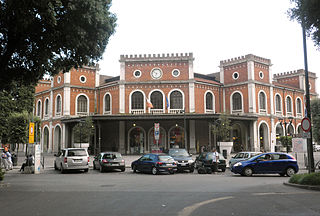
The Milan–Venice railway line is one of the most important railway lines in Italy. It connects the major city of Milan, in Lombardy, with the Adriatic Sea at Venice, in Veneto. The line is state-owned and operated by the state rail infrastructure company, Rete Ferroviaria Italiana that classifies it as a trunk line. The line is electrified at 3,000 volts DC.

The Turin–Genoa railway line is a major Italian rail line, connecting the cities of Turin and Genoa. It is 169 kilometres (105 mi) long.
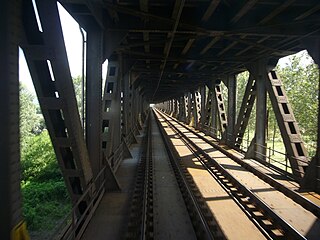
The Genoa–Milan railway is a major Italian rail line, connecting the cities of Genoa and Milan. It is 157 km (98 mi) long and fully electrified at 3,000 V DC. Passenger traffic is managed by Trenitalia.

Voghera railway station serves the town and comune of Voghera, in the region of Lombardy, northern Italy. Opened in 1858, it forms part of the Alessandria–Piacenza railway, and is also the terminus of a railway from Milan via Pavia.
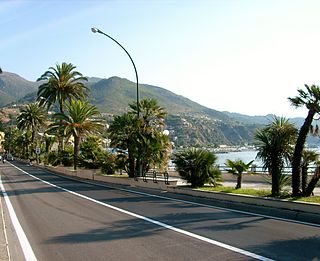
The Strade Statali, abbreviated SS, are the Italian national network of state highways. The total length of the network is about 25,000 km (16,000 mi).

Trenord is a railway company which is responsible for the operation of regional passenger trains in Lombardy. The company was established by the two main railway companies in Lombardy, Trenitalia and Ferrovie Nord Milano (FNM), to manage train operations in the region. The equity is equally divided between the two companies.

Roads in Italy are an important mode of transport in Italy. The classification of the roads of Italy is regulated by the Italian traffic code, both from a technical and administrative point of view. The street nomenclature largely reflects the administrative classification. Italy is one of the countries with the most vehicles per capita, with 690 per 1000 people in 2010.
Milano Serravalle – Milano Tangenziali S.p.A. is an Italian transport company. The company owned the concession until 2028 on Milan to Serravalle Scrivia section of Autostrada A7, as well as the concession of the ring roads or bypass road surrounding Milan. The company was the holding company of Autostrada Pedemontana Lombarda, the operator of A36.

The strada statale 235 "di Orzinuovi" was an Italian state road, created in 1959 and disestablished in 2000. It began in Pavia and ended in Brescia, going through the Po Valley in the Lombardy region.

The strada statale 234 "Codognese" was an Italian state road, created in 1959 and disestablished in 2000. It began in Pavia and ended in Cremona, going through the Po Valley in the Lombardy region.
The Tortona–Genoa high-speed railway, also known as Third Pass, will be a railway in Italy designed for high-speed, high-capacity services linking Genoa to Tortona around 50 kilometres (31 mi) to the north. The railway will form part of the Rhine–Alpine corridor within the Trans-European Transport Networks project.

Autostrada A36, also called Pedemontana Lombarda, is an autostrada 22 kilometres (14 mi) long in Italy located in the region of Lombardy that aims to speed up travel in the north of Milan, creating a road outside the Metropolitan City of Milan to connect the province of Varese with that of Bergamo, as well as the Milan Malpensa Airport with the Orio al Serio International Airport.

Libarna was a Roman city located on the left bank of the Scrivia, on the stretch of the via Postumia between Genua and Dertona. Today Libarna's hamlet is part of the municipality of Serravalle Scrivia, in Alessandria province. Libarna's excavation site is owned by the Italian State, alongside a dedicated museum, also used for musical and artistic events. In 2015 a number of 4565 visitors was recorded at the archaeological site
